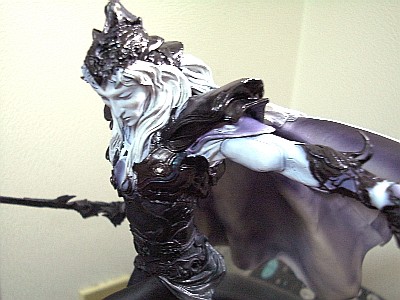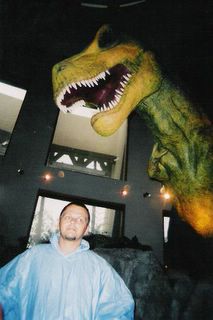Hobbit a Human Offshoot?
'Hobbit' Brain Supports Species Theory
from Associated Press
Scientists working with powerful imaging computers say the spectacular "Hobbit" fossil recently discovered in Indonesia had distinctive brain features that could justify its classification as a separate — and tiny — human ancestor.
 The new report, published Thursday in the online journal Science Express, seems to support the idea of a human dwarf species marooned for eons while modern man spread across the planet. Detractors of the theory, however, said the computer models were unconvincing.
The new report, published Thursday in the online journal Science Express, seems to support the idea of a human dwarf species marooned for eons while modern man spread across the planet. Detractors of the theory, however, said the computer models were unconvincing.
The new research produced a computer-generated model that compared surface impressions on the inside of the fossil skull with brain casts of modern and ancient humans, as well as chimps and other primates. The scientists said the model shows that the 3-foot specimen, nicknamed Hobbit, had a brain unlike anything they had seen before in recent human lineage. The brain is chimplike in size, between 380 and 420 cubic centimeters.
Despite being up to two-thirds smaller than a modern human brain, the Hobbit fossil's brain shared wrinkled surface features with the brains of both modern humans and Homo erectus, tool-making human ancestors that lived more than 1 million years ago, the researchers said. Some of those features are consistent with higher cognitive traits, they report.
At the same time, they said the Hobbit brain was different from the brain of a modern human pygmy or a human with abnormal brain growth.
"This is something new," said Florida State University anthropologist Dean Falk, who led the study. "This discovery has flummoxed the field of anthropology."
In October, scientists from Indonesia and Australia caused an international sensation with their report of a trove of fossils found in a cave on the equatorial island of Flores. As many as seven tiny individuals were represented by the bones in layers that were dated from 95,000 to 12,000 years ago. The Hobbit skeleton was the most complete specimen to be described.
from Associated Press
Scientists working with powerful imaging computers say the spectacular "Hobbit" fossil recently discovered in Indonesia had distinctive brain features that could justify its classification as a separate — and tiny — human ancestor.
The new research produced a computer-generated model that compared surface impressions on the inside of the fossil skull with brain casts of modern and ancient humans, as well as chimps and other primates. The scientists said the model shows that the 3-foot specimen, nicknamed Hobbit, had a brain unlike anything they had seen before in recent human lineage. The brain is chimplike in size, between 380 and 420 cubic centimeters.
Despite being up to two-thirds smaller than a modern human brain, the Hobbit fossil's brain shared wrinkled surface features with the brains of both modern humans and Homo erectus, tool-making human ancestors that lived more than 1 million years ago, the researchers said. Some of those features are consistent with higher cognitive traits, they report.
At the same time, they said the Hobbit brain was different from the brain of a modern human pygmy or a human with abnormal brain growth.
"This is something new," said Florida State University anthropologist Dean Falk, who led the study. "This discovery has flummoxed the field of anthropology."
In October, scientists from Indonesia and Australia caused an international sensation with their report of a trove of fossils found in a cave on the equatorial island of Flores. As many as seven tiny individuals were represented by the bones in layers that were dated from 95,000 to 12,000 years ago. The Hobbit skeleton was the most complete specimen to be described.







 what the Great Conjunction is. 'What's the Great Conjunction?'
what the Great Conjunction is. 'What's the Great Conjunction?' 




 A Is for Androids
A Is for Androids B Is for Boba
B Is for Boba C Is for Calvin
C Is for Calvin D Is for Dragons
D Is for Dragons E Is for Elric
E Is for Elric F Is for Futures
F Is for Futures G Is for Genie
G Is for Genie H Is for Hobbits
H Is for Hobbits I Is for Iceman
I Is for Iceman J Is for Jedi
J Is for Jedi K Is for Kraken
K Is for Kraken





































































0 Comments:
Post a Comment
<< Home